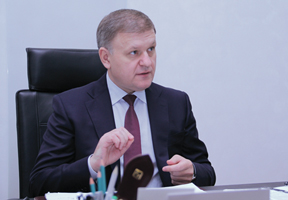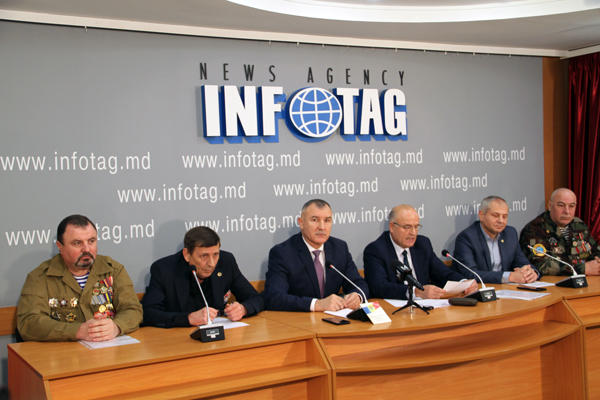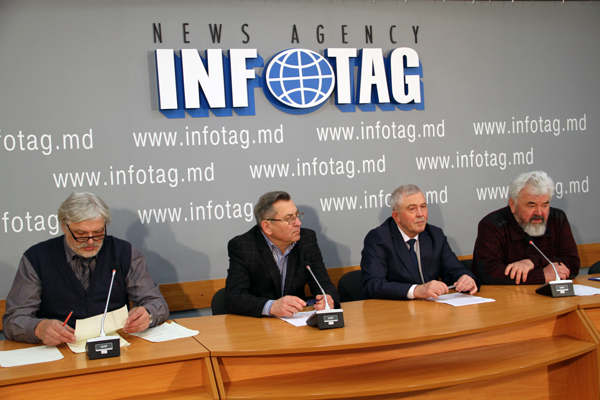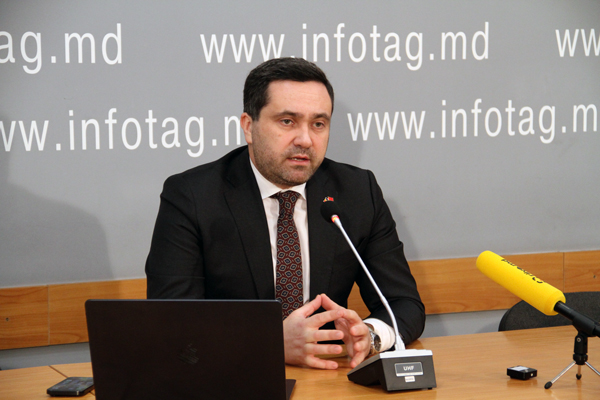Interview
MAIB CELEBRATES 25TH ANNIVERSARY

The Moldova Agroindbank (MAIB) – the country’s largest financial institution – will mark its 25th anniversary on May 8. Out of these 25 years, Chairman Sergiu Cebotari has worked there for 21 years. In the run-up to the jubilee, Director of the Infotag Agency Alexandru Tanas interviewed the bank’s governor. Judging by the MAIB credit portfolio and assets, Moldova associates with this bank its hopes for healing of economy and banking sector, where the international financial institutions should at all costs be returned.
Part 1 of 2. MAIB’s slogan: “Your ideas, our money!”
Question: Mr. Cebotari, the MAIB usually comes to meet clients, who face financial problems during the crisis, though this has a bad effect on bank’s results, raising the portfolio of adverse credits, diverting resources into the risk fund. Why is the bank doing this?
Answer: I think that it is important for Moldova to deeper regard the notion and the classification of adverse credits. In this field, we have to take into account problems both within the country and on external markets domestic producers are exporting their goods to. The bank should support its clients. If we do not do this in the period difficult for them, we will not be able to find other economic agents in Moldova. There are 60 thousand economic agents registered in Moldova. Today, they are as they are and there are no others. The MAIB has worked all these years on business capitalization with a purpose, explaining why it is necessary.
The rate of adverse credits in MAIB is 9.03%, in the country’s banking system in general it exceeds 10%. However, in different periods of time this rate accounted up to 30% depending on the situation in economy. In fact, the index of adverse credits is mostly characterizing the condition of the real sector of economy in which enterprises are acting, but not only the bank’s stability. In this difficult period for the business, we are individually working with each client, so that he to feel the bank’s support, that he can lean on its financial shoulder.
Q: Does it mean that the MAIB is knowingly moving to credit restructuring?
A: Of course, when we are prolonging credits, they are being automatically transferred in another category of classification, getting a tag of “adverse credits”, as they are being transferred from categories A and B in categories C, D, E. Unlike experts, who are discussing on TV about adverse credits in Moldovan banks, we in our bank understand that the tag “adverse” does not mean at all that this credit is unrecoverable. On the example of the MAIB credit portfolio I can say that 58% of adverse credits are urgent credits, whose borrowers are repaying interest rates and the credit in itself in the restructured time frames, agreed with the bank.
Q: Can we say that the bank is also in a certain share guilty of the unfavorable credits?
A: Our assistance to such category of enterprises implies the prolongation of the time or credit repayment, making the repayment schedule more sparing. We help enterprises survive in this difficult time, when the volume of production and exports are falling, while business costs do not become smaller. In order to overcome this difficult period, economic agents need a reliable partner, ready to understand and financially support him, which has been done by the bank, in fact.
Q: Despite all the problems the banking sector went through in 2015, the MAIB remained true to itself, showing enviable financial results. What are these based on?
A: We have been working in all the market segments, achieving a good level of profitability. I think banks should get a lion’s share of revenues from their main destination – crediting and using our classic range of products. However, we are a commercial bank, thus we will be using all the financial instruments on the market, to earn profit to shareholders. The 2015 result is as it should be in a healthy bank. We managed to successfully and profitably place our liquidity on the market.
Q: Should a banker take risk and how often he has to do this?
A: A banker should not be afraid to assume responsibility and to risk at certain moments. If you are afraid, you get into a vicious circle you cannot escape from. It is necessary to deeply analyze everything and correctly assess the situation, as well as it is necessary to listen to intuition, while giving permission for a credit. Besides a thorough studying of business plans we are carefully looking at persons we are going to work with.
Q: This is already something from the field of psychology…
A: You have to be psychologist in a certain measure. You cannot succeed in crediting sphere without intuition.
Q: Have you been taught so, or it is an innate quality?
A: Of course the crediting is being taught, there are even special theories and schools, but the practice is more necessary in this field, as well as many other qualities, especially at issuing large credits. I do not want to talk about the difficult procedure of crediting, but at the detailed discussing of the transaction it is important to understand and be sure of what the client wants, how he sees his business. Thus, the MAIB client’s first interview is being conducted like a reception at a doctor, who has to know all the details before identifying a correct diagnosis.
Q: In 2015, the MAIB got a prestigious client – the state. It has been half a year since you are servicing this client. What can you say – is it just prestigious or also profitable?
A: I would say that this is both prestigious and profitable. However, neither I nor the bank’s entire team should get used with the fact that the bank has budget resources. These are just going through the bank and do not accumulate on accounts. Daily, the balance of these resources is being transferred to the state treasury accounts in the National Bank. Yes, we have high costs, but we cover them by means of the margin, applying corresponding commissions in accordance to the agreement with the Finance Ministry.
Q: Is the MAIB discussing today any credits for projects the market will soon start talking about – for example such as the project with financing the purchasing the Unic shopping center by Rogob company?
A: Currently, we do not have large credit projects. We have proposals, but clients are still waiting. The MAIB slogan has not changed. As before, the bank says to its clients: “Your ideas, our money!”. The business community has ideas, but so far companies are waiting, gaining confidence in economic situation stabilization. From my point of view, the new Government has taken a normal start, it is making steps in the right direction for turning round the negative trend towards the improvement of the situation, including for ameliorating the conditions for doing business.
Large companies are waiting for external financing resumption, signing a memorandum with the International Monetary Fund (IMF), availability of a new Cooperation Program between the Government and the Fund, which will have a financial component. All this is closely connected and the amelioration of the situation should be conducted in complex. A great role in this process is played by the Government, which has already started making correct decisions for business climate improvement.
On the other hand, the price, at which we will provide credit resources on the market, is also very important, as well as what will happen to the monetary policy the new NBM leadership is going to promote. All these interconnected processes will lead to business activity revitalization, as the companies will come to their banks for financial support for practical implementation of interesting projects in economy.
I think that we will have to decide this very soon, while now we are registering a moderate stabilization of the situation and first symptoms of its amelioration, for example the lowering of the base rate and interest rates on banks’ deposits. In the second half of the year these processes should get a faster and, what is more important, irreversible character. This will allow accelerating the economy development pace, as well as raising the population purchasing capacity. (The interview to be continued later today.)
























Add Comment